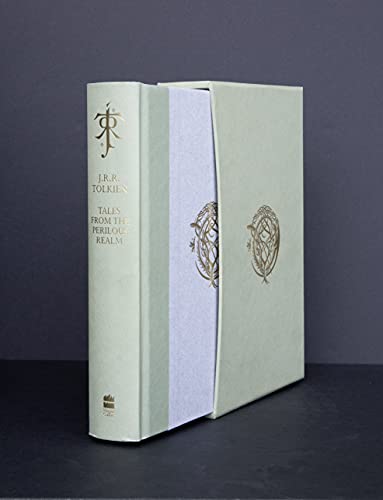Christies Auction December 2023 - Carpenter Letter 154
16 Nov, 2023
(edited)
2023-11-16 4:25:26 PM UTC
2023-11-16 4:25:26 PM UTC
Bidding ends 15th December 2023
Lot 186 - Autograph letter signed (‘JRR Tolkien’) to [Naomi] Mitchison, [Oxford], 25 November 1954
Carpenter #154: Letter from J.R.R. Tolkien to Naomi Mitchison • 25 September 1954 (#402)
Estimate GBP 30,000 - GBP 50,000
No bids
https://onlineonly.christies.com/s/alp ... kien-1892-1973-186/204970
Lot 186 - Autograph letter signed (‘JRR Tolkien’) to [Naomi] Mitchison, [Oxford], 25 November 1954
Details
John Ronald Reuel Tolkien (1892-1973)
Autograph letter signed (‘JRR Tolkien’) to [Naomi] Mitchison, [Oxford], 25 November 1954
Six pages, 240 x 192mm, blind-embossed 76 Sandfield Road letter-paper. Provenance: Sotheby’s, 12 & 13 December 1977, lot 365 ; Sotheby’s, 18 December 1986, lot 183.
A long letter on the realism, moral nuance and historical tradition underpinning The Lord of the Rings: from the economic plausibility of Gondor to the decadence of the Elves. Tolkien would have written before, but has been plagued by ‘business, troubles, illness, and journeys’; he thanks his correspondent for her ‘generous and perceptive’ review of The Lord of the Rings: ‘Yours is the only comment that I have seen that, besides treating the book as 'literature', at least in intent, and even taking it seriously […] also sees it as an elaborate form of the game of inventing a country’. He acknowledges a ‘sketchiness’ in certain elements of the end result, from agricultural implements and metal-working to music, but is confident to greater extent in the economics: the economic ‘likelihood’ of Gondor, with its townlands and fiefs, stands up to scrutiny; ‘The Shire is placed in a water and mountain situation and a distance from the sea and a latitude that would give it a natural fertility’, going on to contrast the needs of the Shire-hobbits with those of the Dwarves, reliant on metals. Some of the 'modernities' in the world he created are probably a mistake, he admits – ‘especially umbrellas’ – but the existence of the Hobbits is fundamentally realistic: ‘I do think people of that sort and stage of life and development can be both peaceable and very brave and tough “at a pinch”. Experience in two wars has confirmed me in that view. But Hobbits are not a Utopian vision…’. Other reviewers have misunderstood The Lord of the Rings as merely a fight between Good and Evil – ‘pardonable, perhaps, in people in a hurry and with only a fragment to read, and […] without the earlier written but unpublished Elvish histories [The Silmarillion]. But the Elves are not wholly good or in the right. Not so much because they had flirted with Sauron; as because without his assistance they were 'embalmers'. They wanted to have their cake and eat it: to live in the mortal historical Middle-earth because they had become fond of it […] and they were overburdened with sadness and nostalgic regret. In this way the Men of Gondor were similar: a withering people whose only ‘hallows’ were their tombs. But in any case this [is] a tale about war, and if war is allowed (at least as a topic and a setting) it is not much good complaining that all the people on one side are against those on the other’. The following three pages are rich in further detail; Tolkien explains that the Downfall of Numenor, the myth underlying the work, is a special variety of the Atlantis tradition, which for him is so fundamental to ‘mythical history’ that ‘some version of it would have to come in’, and offers to send her the account of the Downfall which he has written (‘before the Downfall there lay beyond the Sea and the west-shores of Middle-Earth an earthly Elvish paradise […] that could be reached by ordinary sailing-ships, though the Seas were perilous’), noting that a reprint of The Fellowship of the Ring seems already to be needed (‘but I do not suppose the first printing was very large’).
Naomi Mitchison’s review of The Lord of the Rings appeared in the New Statesman on 18 September 1954: she called it ‘extraordinary, terrifying, and beautiful’. The critical reception of Tolkien's literary work, including The Lord of the Rings, was often sharply divided, with Tolkien taking evident delight in encountering a reader who truly understood the world he had created.
Carpenter #154: Letter from J.R.R. Tolkien to Naomi Mitchison • 25 September 1954 (#402)
Estimate GBP 30,000 - GBP 50,000
No bids
https://onlineonly.christies.com/s/alp ... kien-1892-1973-186/204970












 2035
2035 773064
773064